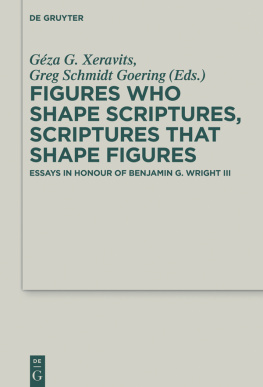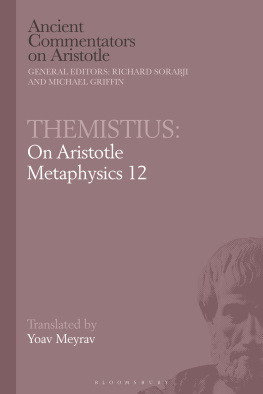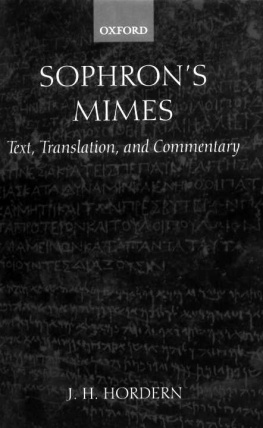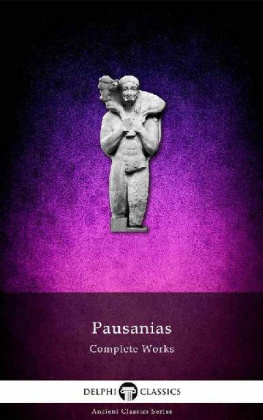Benjamin G. Wright III
The Letter of Aristeas
Commentaries on
Early Jewish Literature
(CEJL)
Edited by
Loren T. Stuckenbruck
and
Pieter W. van der Horst Hermann Lichtenberger
Doron Mendels James R. Mueller
De Gruyter

ISBN 978-3-11-043904-5
e-ISBN (PDF) 978-3-11-043134-6
e-ISBN (EPUB) 978-3-11-043149-0
ISSN 1861-6003
Library of Congress Cataloging-in-Publication Data
A CIP catalog record for this book has been applied for at the Library of Congress.
Bibliographic information published by the Deutsche Nationalbibliothek
The Deutsche Nationalbibliothek lists this publication in the Deutsche
Nationalbibliografie; detailed bibliographic data are available in the Internet
at http://dnb.dnb.de..
2015 Walter de Gruyter GmbH, Berlin/Boston
Typesetting: Drlemann Satz GmbH & Co. KG, Lemfrde
www.degruyter.com
IN LOVING MEMORY OF MY DAD
TERRY WEBER
(OCTOBER 30, 1927MAY 21, 2015)
WHO TAUGHT ME THAT SAILING IS MORE
THAN BEING IN A BOAT
IT IS A LESSON IN LIVING
Preface
No one writes a book on one's own, and I have certainly not written this one alone. This project has taken much longer than I had anticipated when I first agreed to do it, and so, I have many people to thank, some for their direct input and effect on what ultimately I thought and wrote and others for saving my sanity and offering the emotional and spiritual support that I needed to complete this project.
My first expression of gratitude goes to Loren Stuckenbruck, who is one of the finest people that I know. I ended up writing this particular commentary, because at a very difficult time in my life, he showed me great compassion for which I am grateful to him. I thank him for his patience in waiting for a book that I should have sent him long ago. He also encouraged me and provided important feedback for me at various stages of the work. His graduate assistant Amanda Bledsoe also read the manuscript and made numerous helpful suggestions.
There are many scholarly colleagues to whom I owe a great debt for their encouragement and support, and in the same manner as so many other prefaces that I have read, I ask forgiveness of anyone whose name I have omitted inadvertently. Hindy Najman has been a constant conversation partner. She is one of the most collaborative colleagues I know. I am indebted to her for always pushing me to think farther down the path than where I am. Many colleagues have read or heard pieces of this commentary over the years, either through direct conversation or giving feedback on sections of the text or answering my questions, and they all have had an impact on the final product. Others have been consistently encouraging of this project, especially at times when I thought it would never materialize. I am grateful to Sylvie Honigman, Erich Gruen, Albert Pietersma, Cameron Boyd-Taylor, Tessa Rajak, Jan Joosten, Jim Aitken, Eibert Tigchelaar, Robert Kraft, Annette Yoshiko Reed, Steven Fraade, Robert Hiebert, Sidnie Crawford, Judith Newman, Liv Lied, Matthias Henze, Esther Chazon, Adele Reinhartz, Charlotte Hempel, Alison Salvesen, Michael Law, Gza Xeravits, Josef Zsengellr, Gabriele Boccaccini, Francis Borchardt, Eva Mroczek, Myles Schoonover, Stewart Moore. Whatever shortcomings this book has rest on my shoulders alone, however. Over the years, I have had opportunities to speak about the Letter of Aristeas at a number of institutions and seminars, and this commentary has benefited from every one of those conversations. I appreciate the kind invitations to speak and all of the questions and challenges that came my way on those occasions. They all helped to sharpen my thinking and to make this a better work of scholarship.
I have received valuable support from my colleagues at my home institution, Lehigh University. Specifically my thanks go to the Humanities Center and its director Edurne Portela for a generous summer grant in 2009 and to my former student Deborah Streahle, who spent a summer as a research assistant in 2009 tracking down available images of manuscripts of Aristeas. Marian Gaumer, the Academic Coordinator in the Religion Studies Department, always has a positive and encouraging word to say. I am especially indebted to my Lehigh faculty colleagues, Suzanne Edwards, Khurram Hussain, Bill Bulman, Rob Rozehnal and Roslyn Weiss. I owe a special expression of gratitude to my colleague and my friend of 35 years although that word seems inadequate to the relationship that we have had all this time Michael Raposa. We have seen many joyful and difficult times together, and he has supported my work in myriad ways as friend, colleague and department chair.
On a personal level, my family and many friends have lived through this process with me. In so many ways, their contributions have ranked right up with those of my scholarly colleagues, since laughter, consolation, music, a shared meal and a good bottle of wine (or two) are all good for the soul. Many thanks to Frank and Michele Pappalardo, Bill and Carole Schachter, Roy and Cheryl Donkin, and my breakfast club, Rick Santee and Don Kirts. Thanks to my sister and brother-in-law, Carol and Chaz Hutchison for all the rides to the airport.
Finally, I owe the greatest debt to my family my spouse Mary and my three children, Rachel, Nathan and Kate. Without them and their love, the rest means nothing. Mary has been the single greatest support anyone could hope for, and she has taught me the true meaning of the word partner. As I have written this book, my children have moved from middle school to high school through college and into their adult lives. It has been a delight watching them mature, and I could not be more proud of them. To the most important people in my life, I dedicate this book.
Bethlehem, PA
January 14, 2015
Benjamin G. Wright
Table of Contents
I. INTRODUCTION
1. The Present Commentary
The Letter of Aristeas is in some ways an understudied work. This might seem like a strange statement to those who know the bibliography on this product of Alexandrian Judaism, since it figures prominently in a wide range of introductions to Second Temple Jewish Literature and in various scholarly studies, from those concerned with Aristeas itself to those in which Aristeas serves as evidence for the nature of Alexandrian and/or Hellenistic Judaism in the second century BCE (or as a precursor to Philo). Of course, it occupies a central place in any discussion about the origins of the Septuagint. Indeed, the work is one of the few complete Jewish texts from Alexandria in its period, and thus, it is an indispensible source of potential information about both the Jewish community in Alexandria and elite, educated Jews in the Hellenistic world during the Ptolemaic period.








